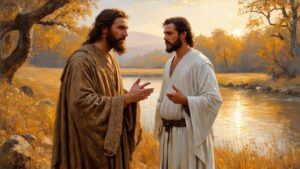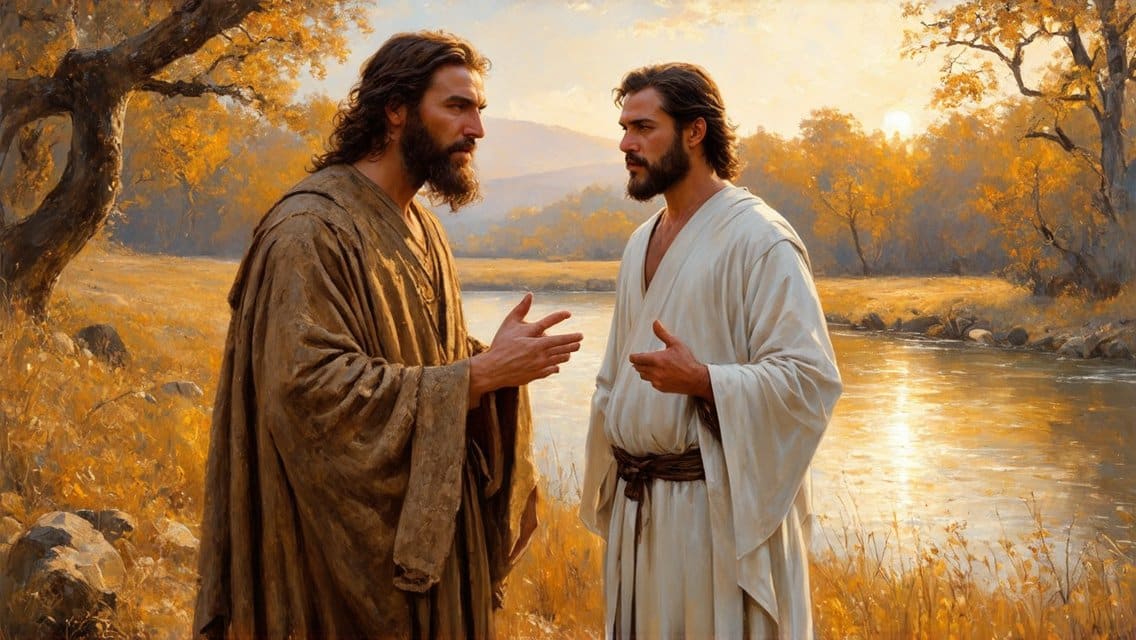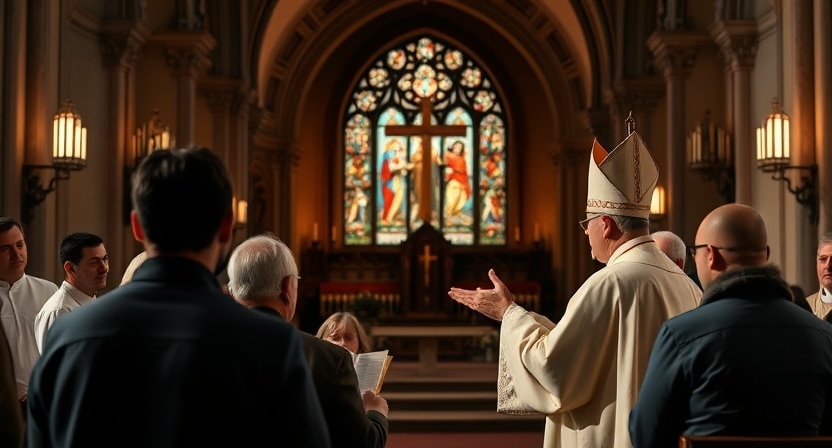SECOND SUNDAY OF THE ORDINARY TIME YEAR A
The arrival of the Saviour
INTRODUCTION AND CONFITEOR
In the Gospel of today’s Mass, John the Baptist points out Jesus to the people as the long-awaited Saviour. Jesus came to take away our sins. He came to heal our wounds. He came to renew us through the Holy Spirit.
Let us call to mind our sins which cling to us like din. [Pause] Let us turn to Christ our Saviour with great confidence.
Lord you are our light and our help; whom shall we fear. Lord, have mercy.
You take away our sins and help us to live as children of the Father. Christ, have mercy.
You constantly renew us through the gift of the Holy Spirit. Lord, have mercy.
HEADINGS FOR READINGS
First Reading (Isaiah 49:3,5-6). The prophet sees himself as God’s servant, chosen to bring Israel back to God, and not just Israel, but all people.
Second Reading (1 Cor 1:1-3). This contains Paul’s rich opening greeting to his converts at Corinth.
Gospel (John 1:29-34). John the Baptist presents Jesus as God’s Chosen Servant who will take away the sins of the people and renew them in the Holy Spirit. v
1st Reading – Isaiah 49:3, 5-6
3 The LORD said to me: You are my servant, Israel, through whom I show my glory.
5 Now the LORD has spoken who formed me as his servant from the womb, that Jacob may be brought back to him and Israel gathered to him; and I am made glorious in the sight of the LORD, and my God is now my strength!

6 It is too little, the LORD says, for you to be my servant, to raise up the tribes of Jacob, and restore the survivors of Israel; I will make you a light to the nations, that my salvation may reach to the ends of the earth.
Responsorial Psalm – Psalms 40:2, 4, 7-8, 8-9, 10
R. (8a and 9a) Here am I, Lord; I come to do your will.
2 I have waited, waited for the LORD,
and he stooped toward me and heard my cry.
4 And he put a new song into my mouth,
a hymn to our God.
R. Here am I, Lord; I come to do your will.
7 Sacrifice or offering you wished not,
but ears open to obedience you gave me.
Holocausts or sin-offerings you sought not;
8A then said I, “Behold I come.”
R. Here am I, Lord; I come to do your will.
8B “In the written scroll it is prescribed for me,
9 to do your will, O my God, is my delight,
and your law is within my heart!”
R. Here am I, Lord; I come to do your will.
10 I announced your justice in the vast assembly;
I did not restrain my lips, as you, O LORD, know.
R. Here am I, Lord; I come to do your will.
2nd Reading – 1 Corinthians 1:1-3
1 Paul, called to be an apostle of Christ Jesus by the will of God, and Sosthenes our brother,
2 to the church of God that is in Corinth, to you who have been sanctified in Christ Jesus, called to be holy, with all those everywhere who call upon the name of our Lord Jesus Christ, their Lord and ours.
3 Grace to you and peace from God our Father and the Lord Jesus Christ.
Alleluia – John 1:14A, 12A
R. Alleluia, alleluia.
14A The Word o God became flesh and dwelt among us.
12A To those who accepted him,
he gave power to become children of God.
R. Alleluia, alleluia.
Gospel – John 1:29-34
29 John the Baptist saw Jesus coming toward him and said, “Behold, the Lamb of God, who takes away the sins of the world.
30 He is the one of whom I said, ‘A man is coming after me who ranks ahead of me because he existed before me.’
31 I did not know him, but the reason why I came baptizing with water was that he might be made known to Israel.”
32 John testified further, saying, “I saw the Spirit come down like a dove from heaven and remain upon him.
33 I did not know him, but the one who sent me to baptize with water told me, ‘On whomever you see the Spirit come down and remain, he is the one who will baptize with the Holy Spirit.’
34 Now I have seen and testified that he is the Son of God.”
HOMILY
In the Gospel John the Baptist tells the people who Jesus is and what his mission is. Jesus is God’s Chosen One who will take away the sins of the world. He is that ‘Servant of the Lord’ Isaiah spoke about (cf. First Reading) who would gather the scattered tribes of Israel and bring them back to God. Indeed his mission would go further. He would be ‘a light to the nations’ and would bring salvation to the very ends of the earth. But how are we to understand salvation? First of all we must look at sin.
Once upon a time there was a proud and beautiful porcelain teapot. How it loved to be admired! However, it was very frail and delicate. Consequently it was only used on very special occasions, and only for the most important visitors. But then disaster struck. One day a careless servant dropped it. The lid and spout were both smashed. The beautiful teapot was now considered to be quite useless and was thrown out.
For a long time it lay in a refuse dump amid a pile of junk. Coats of dirt and grime settled and grew on it, blotting out whatever traces of beauty it still possessed. From time to time people came to the dump looking through the things that had been thrown away, hoping to find something that they could rescue. They would pick up the teapot and say, ‘What a pity it got broken! It must have been really lovely when it was in one piece’. However, for the most part, people didn’t even bother to take it into their hands. They dismissed it at the first glance, and hurried on to something else. Like all discarded things, the poor teapot had no alternative but to seek refuge in dreams. It dreamed that it was whole again.
Now among those who frequented the dump was a famous flower grower. He came to the dump simply to discard weeds and other useless things. But one day his eye fell on the discarded teapot. A keen man, he immediately saw through the coats of dirt. He rescued it and took it home with him. The first thing he did was clean it up. He was amazed at its beauty, and wondered how, in spite of its brokenness, anyone could just throw it away. He realised of course that it could never again be used as a teapot but surely it was good for something. Then he suddenly had an inspiration. He would use it as a flower pot.
Having placed some good soil in it, he planted a seed in it, and placed it in the front window of his house. Time passed. The seed grew and blossomed into a beautiful flower. It was so beautiful that passersby began to stop and admire it. The flower was charming, but what people admired even more was the handsome pot in which it grew. ‘Where did you get such a lovely pot?’ they asked. ‘In a dump,’ the flower grower replied. Many thought he was joking and didn’t believe him. But those who knew what a careful and skillful man he was did believe him.
John said that Jesus would ‘take away’ our sins. The expression ‘take away’ is inadequate. Jesus took away the guilt of our sins. Once we have confessed our sins we should shake the guilt of them from ourselves. But sin cannot be removed just like that. We do not experience sin as a brief bad dream that can be thrown off by confession. We live in it. It is a disease from which we suffer.
We cannot, therefore, just wipe it off. We cannot even shake it off. It goes deeper. We are born with it. It is part of us. It is a condition of brokenness and alienation, alienation from ourselves, from others, and from God. Each of us is cracked, broken, wounded, and damaged. We have eyes that cannot see. Ears that cannot hear. Tongues that cannot speak. Wills that cannot decide. And above all hearts that cannot love. Therefore a bath will not suffice to make us well. We need to have our brokenness repaired, and our wounds healed.
The healing process is long and often painful. It comes through a relationship of love with another person. This is precisely what Jesus came to do. He went down among sinners (as the flower grower went down to the dump). He associated with them, so much so that he was branded as one of them, though he was whole and innocent. He sought out those who were lost and discarded, gave them a sense of worth, and restored them to the friendship and love of the heavenly Father. This was the Good News. But of course it was only good news for those who recognised their brokenness and who longed for wholeness. To be redeemed, then, is to be made whole and well. It is to be restored to our original brightness through the grace of the Holy Spirit. However, this is a lifelong process.
Besides personal sin and personal redemption, there is social sin and social redemption. It is not only individuals who are broken. The unity of the whole human family is broken because of sin. People are alienated from one another and from God. Jesus came to bring us back to one another and to our heavenly Father. He came to gather together the new People of God, made up not just of the tribes of Israel, but of all the peoples of the world.
‘It is an extra ordinary thing for people with a handicap (and we are all handicapped) to discover that they are loved’. (Jean Vanier).
‘I can stand as remote from myself as from another’. (Thoreau).
PRAYER OF THE FAITHFUL
Christ is now in our midst, the great Healer and Saviour whom John pointed out to his contemporaries. Let us pray that we may receive the fullness of his redemption and salvation. R. Lord, graciously hear us.
For the Church: that Christ may heal in it the wounds caused by sin and division. [Pause] Lord hears us.
For all nations: that the presence of Christ may bind them to one another in bonds of love and peace. [Pause] Lord hears us.
For all the sick and the handicapped: that through the love and care of others they may find health and self-worth. [Pause] Lord hears us.
That through the grace of the Holy Spirit we may constantly seek to overcome our sins so that we may live up to our dignity as children of God. [Pause] Lord hears us.
For local needs.
Let us pray:
Father, we make all our prayers to you, through Christ the innocent Lamb, the sinless one who takes away our sins, and who now lives and reigns with you and the Holy Spirit, one God, for ever and ever.
COMMUNION REFLECTION
The part of us which is most deeply
damaged by sin is the heart.
The heart is so beautiful, so innocent,
but it can be betrayed, scorned, and broken.
A mother tells how her three-year-old son
was struck down with paralysis of the legs
which gradually spread over his whole body.
He became blind too.
One day, some months before he died,
the mother was sitting weeping by his bedside,
when he suddenly turned to her and said:
‘Don’t cry, Mummy,
I still have a heart to love my Mummy’.
That small boy had attained real maturity.
But he had only been able to attain it
through the love and support of his mother.
Love redeems and saves everything.
It is the only thing that can heal
the wounds of the heart.


